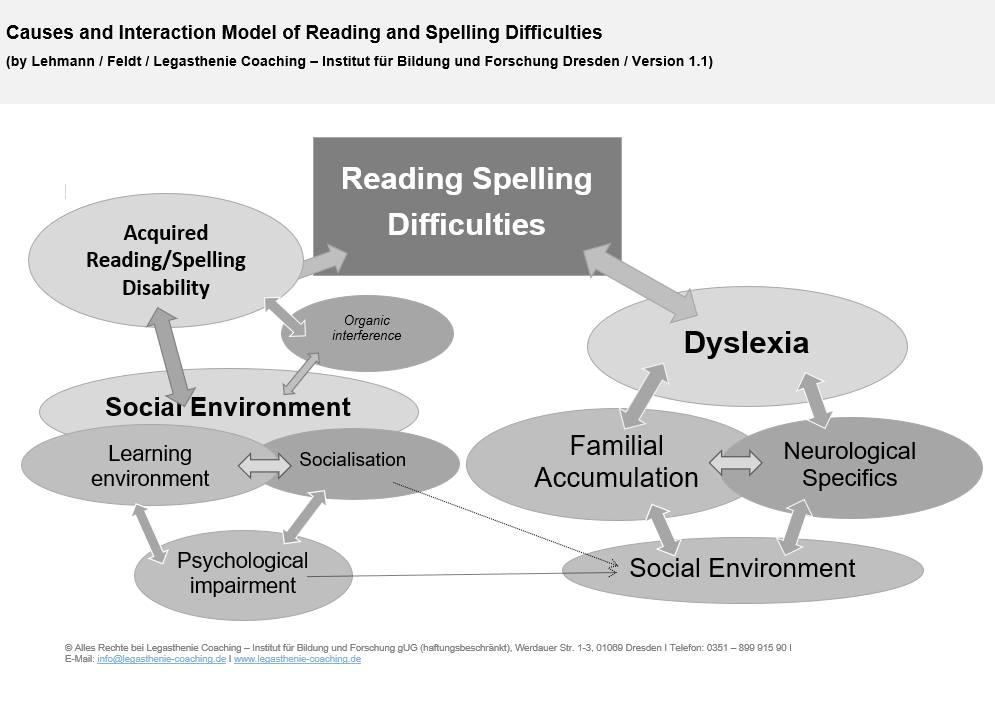 There are many terms for reading spelling difficulties. Today we know reading spelling difficulties, LRS, dyslexia, reading spelling disorder, dyslexia, isolated spelling disorder, isolated reading disorder and much more. There are many different interpretations in medicine and education. LRS and dyslexia have been researched for about 130 years. To this day, the entire problem is often regarded from a medical-psychological point of view as a reading, spelling and writing disorder. There is still a great need for research and professional discussion here.
There are many terms for reading spelling difficulties. Today we know reading spelling difficulties, LRS, dyslexia, reading spelling disorder, dyslexia, isolated spelling disorder, isolated reading disorder and much more. There are many different interpretations in medicine and education. LRS and dyslexia have been researched for about 130 years. To this day, the entire problem is often regarded from a medical-psychological point of view as a reading, spelling and writing disorder. There is still a great need for research and professional discussion here.
From our research and many years of practice we know that there can be many causes for problems in the acquisition of written language. There is still little consensus among experts on this point. This is why the terms LRS and dyslexia are still interpreted differently today, or are also referred to as reading and spelling weaknesses (LRS), which means the same for all weaknesses in the acquisition of the written language. From an ethical and person‘s rights point of view, the medical reading and spelling disorder (Bundesverband Legasthenie und Dyskalkulie e. V.) as listed in the manual of the ICD-10 ( psychological disorders) must be viewed critically, because this is a medical construct that has not yet been comprehensively proven scientifically. We know from our practice that there must be different causes for reading and spelling weaknesses. We are therefore in favour of a better differentiation and categorisation of these weaknesses. Every affected person should receive comprehensive and inclusive support according to his or her abilities and possibilities.
Therefore, refusing to distinguish the causes of these weaknesses is of little help to those affected. With a precise knowledge of the causes and interactions, there is a chance that the difficulties can be overcome better than has been the case in education so far.
That is why we have developed a social science model for the causes and interactions of reading and spelling weaknesses that is not only applicable to the German-speaking world, but can also be applied to the entire western world.
Acquired reading/spelling weakness (LRS)
LRS is a container term that roughly summarises all possible weaknesses in reading and writing in education. There is no differentiation here! Therefore, this pedagogical provision is not suitable for a comprehensive diagnosis and advancement of those affected. The LRS classes (Special classes are common in the federal states of Saxony and Thuringia.) are scientifically controversial, because the more precise causes and interactions of the various reading and spelling weaknesses are not investigated and differentiated here.
Most of the causes of the acquired LRS are related to the social environment, which is related to the learning environment (learning method „Swiss model“, class climate, school change, etc.) and the socialisation (social structure, family learning incentives, etc.) of the persons concerned. These interactions and environments can favour psychological impairments. As a rule, these weaknesses are to be understood as temporary difficulties and can be overcome well and more quickly than is the case with dyslexia, because they have been acquired by the social environment. In dyslexia, the social environment plays only an indirect role in coping with this weakness.
In addition, there is a smaller group of reading and spelling difficulties that may be acquired as a result of organic impairments. These are often related to early childhood development (brain damage, premature births, eye and ear diseases). These patients also often have similar problems, which can also occur in connection with psychological impairments as well as cognitive development.
Dyslexia
A dyslexia is predominantly due to a genetic predisposition. Norman Hinshelwood and Pringle Morgan were among the first pioneers of medical dyslexia research. In the 19th century, they observed a frequent occurrence of dyslexia within families and concluded at that time that there was a hereditary predisposition. This suspicion has been proven by studies in recent decades. 50 to 70 percent of reading, right and writing weaknesses can result from a family accumulation. This is confirmed by our own statistics, according to which about 50 percent of the problems can be related to a predisposition. Other reading and spelling weaknesses may have been acquired, as explained by our model.
Today, research is much more advanced and it is assumed that both genetic predispositions (family accumulation) and the social environment can promote dyslexia. Both influencing factors, genetics and the environment, can affect both visual and auditory processing (neuronal peculiarity). Under certain circumstances, dyslexia may occur during the development of speech. Today, dyslexia is seen as a complex weakness in the processing of linguistic information.
Dyscalculia probably results from similar circumstances. In practice, we often observe a combination of dyscalculia and dyslexia. Studies show that 40 to 70 percent of children with dyscalculia also have dyscalculia. The more detailed relationships between the two predispositions still need to be researched in detail.
One thing is certain: these difficulties have nothing to do with laziness or stupidity. They are also not due only to the social environment, the cultural circle or a lack of education. They are nothing more than a norm variant of human intelligence, which requires special individual support, constant training and in some cases the help of a psychotherapist. Mental impairments are to be understood as an indirect consequence of an unresolved dyslexia, since a dyslexia does not automatically lead to a mental illness. The social environment (learning environment and socialisation) of those affected can favour or protect them. Therefore, the social environment is often an indirect factor in whether dyslexics can overcome their weakness or suffer mental disability. In an LRS, it is usually the social environment that can promote the acquisition of literacy difficulties.

